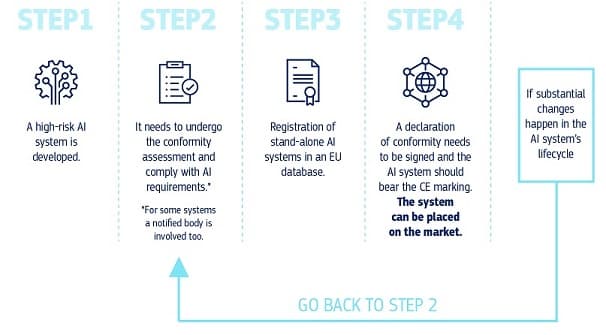This month, the European Union formally adopted its AI Act. HR leaders around the world, even those without a presence in Europe, can look to this ruling as a framework for minimizing the risk of artificial intelligence at work.
The legislation categorizes AI applications into risk tiers: unacceptable, high, limited and minimal. Much of HR tech that deals with employment is considered high-risk, according to the definitions of the AI Act.
According to the legislation, high-risk AI systems must undergo rigorous pre-market obligations to ensure the quality of input datasets to prevent discriminatory outcomes. There must also be appropriate human oversight, high levels of security, clear traceability of information and more.
So, what do HR leaders need to know about the EU AI Act? For many companies, the onus will be on understanding vendor controls, says Asha Palmer, senior vice president of compliance at Skillsoft. Some employers are forming artificial intelligence governance teams to build best practices around evaluating risk. Palmer believes the human resource industry is in a strong position to contribute to these governance structures.
HR leaders should understand how work tech platforms are being used and how they could be used in the future, says Palmer. If any appear to be high-risk (which many HR tech systems will be), the vendor needs to be held to the standards set forth by EU guidelines, specifically if the organization has a presence in Europe.
Employers without a presence in the EU might feel they can be a little less stringent, “but why would you?” asks Palmer.
There will be more to come on this, and I’ve been following along with HR leaders at organizations in the throes of building AI governance teams and will continue to share more.
Kate Bravery, the author of Mercer’s Global Talent Trends report, provides excellent advice on LinkedIn. She writes that “the impact of AI on end users and society can’t be ignored,” so organizations should consider how they interact with and build innovations, beyond the scope of internal functionality.
She also recommends enhanced “workforce communication and training programs to foster firm-wide awareness of the changing regulatory landscape.” While we all crave a checklist that helps us take action, this is a time of great change, and a reflective and agile mindset might be the hottest asset of our time.

HR tech in action
Employee engagement and experience platform Culture Amp announced that it will acquire people analytics platform Orgnostic. RedThread analyst Stacia Garr wrote on LinkedIn that “this acquisition represents the first integration of these technologies outside of the jumbo vendor class and should make people analytics more accessible to HR leaders and managers at a wider variety of companies.”
Microsoft tapped Mustafa Suleyman to lead the tech giant’s initiatives in consumer AI products. Previously, Suleyman played a significant role at Google’s DeepMind, an AI research lab acquired by Google in 2014. He also co-founded Inflection AI, a start-up valued at $4 billion and backed by investments from companies including Microsoft and Nvidia. Suleyman will report to Microsoft CEO Satya Nadella.
Learning content solution Cornerstone OnDemand has acquired Talespin, a spatial computing firm specializing in extended reality (XR) and gen AI immersive learning. Talespin’s capability offers virtual, augmented and mixed reality for learning in the flow of work in virtual worlds that simulate real-life physical, behavioral and emotional situations.
More from HRE
Stacey Harris of Sapient Insights Group writes that many large system vendors rely on their partner networks to handle implementations in certain regions or for certain industry segments. Whoever works with you on your implementation—the vendor, a vendor partner or a third party of your choice—should have a solid track record working with companies like yours.
For all the good AI can bring to an organization, it isn’t a magic bullet, according to Maria Goyer, chief innovation officer at Innovative Employee Solutions. The technology can’t yet apply emotional intelligence, intuition or insights to a set of facts. Nor can it exercise any real creativity, curiosity or originality. It’s only able to base its outputs on its inputs, so iterations of what’s already been conceived will be the likeliest results.
Sandra Bolder, chief people officer at Arcadis; Marieke Pepers, chief people officer at Nmbrs; Uzair Qadeer, chief people officer at the BBC; and Esmé Valk, CHRO of Royal Schiphol Group will be among the HR leaders speaking at HR Tech Europe in Amsterdam this May. Register now, and I’ll see you there!
Credit: Source link











